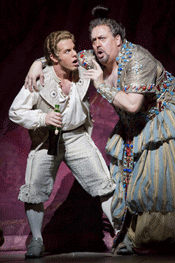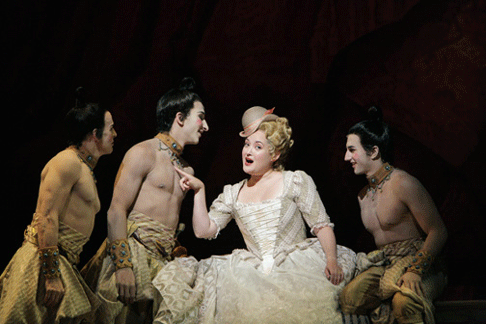![Mary Dunleavy (Constanze) and Matthew Polenzani (Belmonte) [Photo by Cory Weaver courtesy of San Francisco Opera]](http://www.operatoday.com/DunPol2_CW.gif)
13 Oct 2009
Abduction from the Seraglio in San Francisco
Some of the more memorable achievements of San Francisco Opera occurred in the brief life-span of its Spring Opera season, 1961-1981.
English Touring Opera are delighted to announce a season of lyric monodramas to tour nationally from October to December. The season features music for solo singer and piano by Argento, Britten, Tippett and Shostakovich with a bold and inventive approach to making opera during social distancing.
This tenth of ten Live from London concerts was in fact a recorded live performance from California. It was no less enjoyable for that, and it was also uplifting to learn that this wasn’t in fact the ‘last’ LfL event that we will be able to enjoy, courtesy of VOCES8 and their fellow vocal ensembles (more below …).
Ever since Wigmore Hall announced their superb series of autumn concerts, all streamed live and available free of charge, I’d been looking forward to this song recital by Ian Bostridge and Imogen Cooper.
The Sixteen continues its exploration of Henry Purcell’s Welcome Songs for Charles II. As with Robert King’s pioneering Purcell series begun over thirty years ago for Hyperion, Harry Christophers is recording two Welcome Songs per disc.
Although Stile Antico’s programme article for their Live from London recital introduced their selection from the many treasures of the English Renaissance in the context of the theological debates and upheavals of the Tudor and Elizabethan years, their performance was more evocative of private chamber music than of public liturgy.
In February this year, Albanian soprano Ermonela Jaho made a highly lauded debut recital at Wigmore Hall - a concert which both celebrated Opera Rara’s 50th anniversary and honoured the career of the Italian soprano Rosina Storchio (1872-1945), the star of verismo who created the title roles in Leoncavallo’s La bohème and Zazà, Mascagni’s Lodoletta and Puccini’s Madama Butterfly.
Evidently, face masks don’t stifle appreciative “Bravo!”s. And, reducing audience numbers doesn’t lower the volume of such acclamations. For, the audience at Wigmore Hall gave soprano Elizabeth Llewellyn and pianist Simon Lepper a greatly deserved warm reception and hearty response following this lunchtime recital of late-Romantic song.
Collapsology. Or, perhaps we should use the French word ‘Collapsologie’ because this is a transdisciplinary idea pretty much advocated by a series of French theorists - and apparently, mostly French theorists. It in essence focuses on the imminent collapse of modern society and all its layers - a series of escalating crises on a global scale: environmental, economic, geopolitical, governmental; the list is extensive.
For this week’s Live from London vocal recital we moved from the home of VOCES8, St Anne and St Agnes in the City of London, to Kings Place, where The Sixteen - who have been associate artists at the venue for some time - presented a programme of music and words bound together by the theme of ‘reflection’.
'Such is your divine Disposation that both you excellently understand, and royally entertaine the Exercise of Musicke.’
Amongst an avalanche of new Mahler recordings appearing at the moment (Das Lied von der Erde seems to be the most favoured, with three) this 1991 Mahler Second from the 2nd Kassel MahlerFest is one of the more interesting releases.
‘And there was war in heaven: Michael and his angels fought against the dragon; and the dragon fought and his angels, And prevailed not; neither was their place found any more in heaven … that old serpent … Satan, which deceiveth the whole world: he was cast out into the earth, and his angels were cast out with him.’
If there is one myth, it seems believed by some people today, that probably needs shattering it is that post-war recordings or performances of Wagner operas were always of exceptional quality. This 1949 Hamburg Tristan und Isolde is one of those recordings - though quite who is to blame for its many problems takes quite some unearthing.
There was never any doubt that the fifth of the twelve Met Stars Live in Concert broadcasts was going to be a palpably intense and vivid event, as well as a musically stunning and theatrically enervating experience.
‘Love’ was the theme for this Live from London performance by Apollo5. Given the complexity and diversity of that human emotion, and Apollo5’s reputation for versatility and diverse repertoire, ranging from Renaissance choral music to jazz, from contemporary classical works to popular song, it was no surprise that their programme spanned 500 years and several musical styles.
The Academy of St Martin in the Fields have titled their autumn series of eight concerts - which are taking place at 5pm and 7.30pm on two Saturdays each month at their home venue in Trafalgar Square, and being filmed for streaming the following Thursday - ‘re:connect’.
The London Symphony Orchestra opened their Autumn 2020 season with a homage to Oliver Knussen, who died at the age of 66 in July 2018. The programme traced a national musical lineage through the twentieth century, from Britten to Knussen, on to Mark-Anthony Turnage, and entwining the LSO and Rattle too.
With the Live from London digital vocal festival entering the second half of the series, the festival’s host, VOCES8, returned to their home at St Annes and St Agnes in the City of London to present a sequence of ‘Choral Dances’ - vocal music inspired by dance, embracing diverse genres from the Renaissance madrigal to swing jazz.
Just a few unison string wriggles from the opening of Mozart’s overture to Le nozze di Figaro are enough to make any opera-lover perch on the edge of their seat, in excited anticipation of the drama in music to come, so there could be no other curtain-raiser for this Gala Concert at the Royal Opera House, the latest instalment from ‘their House’ to ‘our houses’.
"Before the ending of the day, creator of all things, we pray that, with your accustomed mercy, you may watch over us."
![Mary Dunleavy (Constanze) and Matthew Polenzani (Belmonte) [Photo by Cory Weaver courtesy of San Francisco Opera]](http://www.operatoday.com/DunPol2_CW.gif)
Some of the more memorable achievements of San Francisco Opera occurred in the brief life-span of its Spring Opera season, 1961-1981.
This long ago April-May season embraced the lesser known and experimental repertory, premieres and advanced staging style looks at nearly anything that might be called opera. And sung in English, the language of its audience. Thus almost immediately (1962) Spring Opera gave San Francisco Mozart’s Abduction from the Seraglio — it readily qualified as lesser known, it was an experiment — Mozart’s own experiment into singspiel, and with its dependence on the spoken work it was not really opera.
Spring Opera’s headier moments happened in its later years at the Broadway-style Curran Theatre, and among these moments again was Abduction (1975) this time in the hands of jack-of-all-theatre-trades Jack O’Brien (but that handle is now, back then it was his first, experimental foray into opera). O’Brien’s first revelation was that Abduction was not about its story told in spoken words, it was about its music, thus he slashed its dialogues to the absolute bone, and let them sing. One of Spring Opera’s slickest productions resulted.
 Andrew Bidlack (Pedrillo) and Peter Rose (Osmin)
Andrew Bidlack (Pedrillo) and Peter Rose (Osmin)
But these days Abduction is big-house stuff, not only in repertory weary San Francisco but around the world. Just last March Lyric Opera of Chicago unveiled a new production of Die Entführung aus dem Serail that is currently on the War Memorial stage. Only in Chicago the spiel was in German (well, there was one German in the cast) while in San Francisco the dialogues were mostly in American though the sing fortunately was in German — the one German in sight was a very important one, the young maestro Cornelius Meister. This uncomfortable language duality left he ear confused. It also gave rise to the trivial critical question as to whether Mozart's opera should have been entitled Entführung in San Francisco, or Abduction as preferred by the SFO program booklet.
But the answer is easy — it was an Entführung. It all happened in the pit, the San Francisco Opera Orchestra rising magnificently to the occasion of the American debut of 29 year-old, wunderkind Cornelius Meister. This fine orchestra responded to the warmth and to the joyous overflow of rare and new Mozartian colors imparted by the young German maestro, and played with a beauty of string tone that gave the evening (2/10) its considerable musical luster.
Mozart’s simple singspiel has two monster roles, that of the abducted Constanze and her rescuer Belmonte. Matthew Polenzani, an alumnus of Lyric Opera’s young artist program and now a highly credentialed Mozart singer, brought urgency, beauty of tone and perfect phrasing to the considerable amount of singing Mozart’s hero must accomplish. Mary Dunleavy, a recent SFO Gilda, took on the fiendishly difficult Constanze and succeeded gracefully enough, appropriately displaying her quite beautiful voice, considerable technique and solid high notes in the opera’s grand soprano showpiece Martern aller Arten.
 Anna Christy (Blonde) and the Pasha's guards
Anna Christy (Blonde) and the Pasha's guards
Unfortunately Es lebe die Liebe, Mozart’s famous tour de force reunion quartet, did not succeed in musically uniting its four singers — though Anna Christy acquitted herself handsomely as Blonde throughout the evening, Adler Fellow Andrew Bidlack was over parted as Pedrillo, not yet a match for arrived artists. Bass Peter Rose was a vocally pale Osmin, his smooth voice and soft presence an uncomfortable match to Mozart’s sharper buffo demands. The Pasha of actor Charles Shaw Robinson made no effect.
While Mr. Rose’s Queen’s English inflected speeches were no more at odds with the character of the Turkish lecher Osmin than Hochdeutsch might have been, his Samurai wig was, as was his most fanciful Papageno-like costume, not to mention his retinue of little, bare chest Samurai eunuchs. In fact one was not sure what was supposed to be happening on the Baroque stage within the War Memorial stage.
Accounts of the Chicago performances talk about an old Pasha who began imagining this episode of his lost youth during the overture, about a trap door that opened into the false stage where Belmonte then climbed out, and soon a young Pasha appeared as well, explaining that this was a performance within a performance. None of this or anything else of the Chas Rader-Shieber Chicago concept made it to San Francisco. What we saw in San Francisco was inexplicable.
Besides Blonde’s jaunty yellow hat the quartet of lovers costumes were elaborately period, including Constanze’s wigs. So it was costume opera, take it or leave it. The crowd gamely took it, and applauded young Mozart’s Italianate attempt at singspiel that belonged in a much smaller theater, and cheered the appropriately attractive youthful cast and conductor.
Michael Milenski